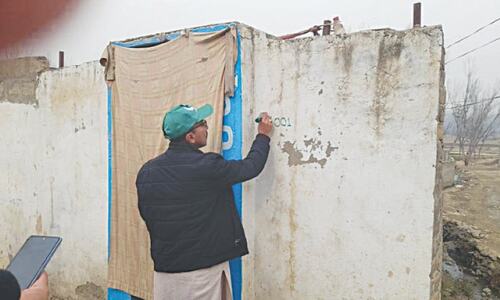
Telling Twilight
By M. Athar Tahir
University of Punjab
ISBN: 978-969-9325-95-3
180pp.
I n a bid to express emotions, feelings and ideas, poets have for ages used various verse forms and continue to do so to this day. Among these various forms, the sonnet is one that has maintained an enduring appeal for English poets as well as readers, mainly because of its capacity to express a variety of themes in an eloquent and condensed manner.
And it is this structured form that Athar Tahir, one of Pakistan’s finest poets writing in English, has made use of in his latest collection, Telling Twilight, which contains 140 sonnets.
The introduction to this collection is written by Dr Faisal Nazir, who is himself a poet and writer, currently teaching as an assistant professor at the Department of English of the University of Karachi. As pointed out by Dr Nazir, the sonnet makes poetic expression limited due to its fixed requirements about lines, rhyme scheme and overall structure.
Tahir has managed, however, to remain within these boundaries without compromising his creative expression as well as the intensity of feeling, an element considered essential in good poetry by many poets, especially the romantics. John Keats, for instance, said that the “greatness of poetry lies in its intensity.”
The collection comprises a number of themes including love, loneliness, ageing, Sufism, etc. However, it is the theme of love that dominates, though at the risk of sounding clichéd. But when emotions are genuine and mature, not simply raw, creative expression finds ways to overcome that risk to a great extent. We can relate to the narrator’s engagement and reflections on love.
A new collection of poems by one of Pakistan’s foremost English poets utilises the genre of sonnet to muse about love, loneliness, ageing and mysticism
Among these love sonnets, I believe that ‘Sonnet for Samia’, the second in the collection, summarises almost the entire point of how Tahir sees love. He challenges the idea of love being tied to reciprocation. Tahir says here that true love is accepting, unconditional and independent of responses.
Tell me a truth above love. What beauty Lives forever in seasons of the heart?
What love stays the same like a plastic dart?
...What’s love if it must respond or return?
In the end, he finds truth in love’s imperfections and sees those imperfections as part of true love’s nature. So, unlike many poets, Tahir shows acceptance of unrequited love.
As he says:
Acceptance alone awaits no bargain.
It can clap with one hand and yet remain
Calm in the face of beauty, joy and love
And consume with its incompleteness. That
Is the truth, beyond the senses’ diktat.
The last line sounds similar to what John Keats says in his Ode on a Grecian Urn:
Beauty is truth, truth beauty, — that is all
Ye know on earth, and all ye need to know.
At various points, Tahir also opposes labelling love with a name. As he says “let love remain love, do not give it a name”, that it is a “terrain beyond words” and should not be “tarnished with a name.” This reflects a wider belief among poets and philosophers that matters such as faith, truth and love are unexplainable in language. Those who know, just know.
But amid this acceptance, the poet also expresses a deep sense of isolation, loneliness and angst as ‘Sonnet XLI’ shows:
Solitary, used more to the unsaid
One inhabits mental plain where not
A moment colours into love, where not
A fragrance tremors a presence. Instead
All is a lack in this desolation
That has been emptied of everything
Touched, felt, and embraced long ago. Nothing
Prevails here except isolation….
In his other sonnets, Tahir is concerned about ageing, somewhat similar to Eliot’s Prufrock. Sonnet LVII, for instance, talks about the effects ageing has on the body through visual imagery and how it simultaneously relates to the condition of the mind.
Imperceptibly new folds form on the
Face and unnoticed wrinkles emerge on
the forehead
…Ears hang as they never did before
And the hair recede like surf on the beach
Some sonnets deal with subjects of Wahdatul Wujood [the Sufi belief in unity of existence] and Wahdatush Shuhood [unity of vision] while others talk about a wrestler. Very much like Tahir’s poetic skills and his tackling the verse forms with creative moves, the wrestling trainer, or Khalifa-Ji, is shown in the akhaarra, putting on his own moves. Following that, one also sees the disheartening change Khalifa-Ji witnesses when the akhaarra is closed due to lack of patronage, again reflecting the state of art, poetry and poets in society.
Overall, there is delicacy and exquisiteness in Tahir’s verse. Along with that, however, there is simplicity also. William Wordsworth, again a Romantic poet, believed poetry should be simple and that achieving it was not easy, as it came from the depth of a poet’s experience. The deeper a poet’s experience, the simpler he can put his emotions and feelings into words.
Keeping that in view, one still feels a certain lack of depth or experience, as a few sonnets become vague, leaving the reader struggling to make full connections. Similarly, the poet could have done even better by employing new or fresh metaphors, imagery and symbols instead of conventional ones — such as that of sea and waves to talk about love — for his expression of thoughts on different subjects in the collection.
Along with that, Tahir’s reflections on and portrayal of love are also quite traditional. I believe that taking further into account the complexities involving love at the present time would have made the collection more relevant and an even better read for poetry lovers.
The reviewer is a member of staff.
X: @WaqasAliRanjha
Published in Dawn, Books & Authors, October 6th, 2024














































Dear visitor, the comments section is undergoing an overhaul and will return soon.